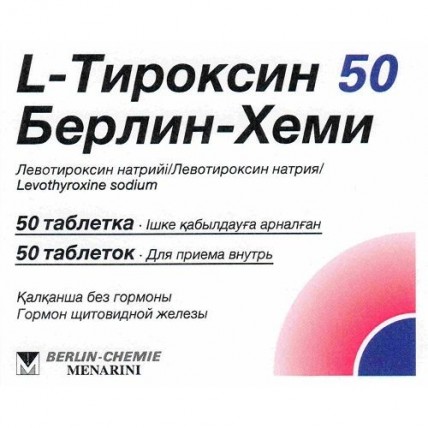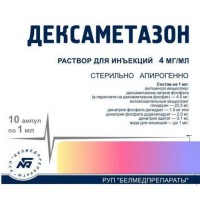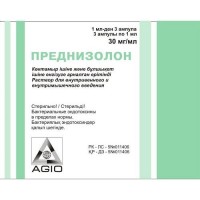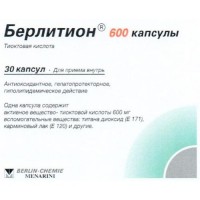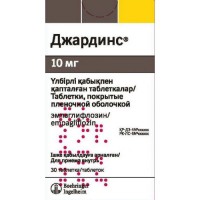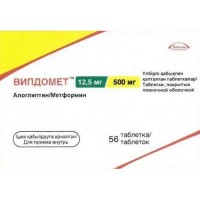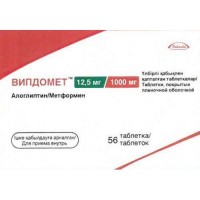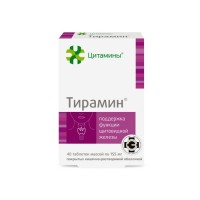L-Thyroxine 50 mcg (50 tablets)
- $8.00
L-Thyroxine aka Levothroid, Levoxyl, Synthroid, Unithroid.
One tablet contains the active substance - Levothyroxine sodium (Levothyroxine) 0.05 mg
excipients: microcrystalline cellulose, calcium hydrogen phosphate dihydrate, sodium carboxymethyl starch (type A), dextrin, long-chain partial glycerides.
- replacement of thyroid hormones in hypothyroidism of any etiology
- prevention of recurrence of goiter after removal of euthyroid goiter
- euthyroid benign goiter
- adjuvant therapy against the background of therapy of hyperthyroidism with thyreostatics after reaching the state of euthyroidism
-suppressive and replacement therapy for malignant neoplasms of the thyroid gland, mainly after thyroidectomy
- thyroid suppression test
The dosage instructions are considered as a guide. The individual daily dose should be determined based on the results of laboratory and clinical studies.
If residual thyroid function is preserved, a lower dose may be sufficient for replacement therapy.
In elderly patients, in patients with coronary artery disease, and in patients with severe or chronic hypothyroidism, treatment with thyroid hormones should be started with extreme caution - for example, it is recommended to start treatment with a lower dose, and increase it slowly, at significant intervals, often checking the level of thyroid hormones. hormones. Experience has shown that both in patients with low body weight and in patients with large nodular goiter, lower doses of the drug are sufficient.
Because T4 or fT4 levels may be elevated in some patients, serum TSH is better suited for monitoring treatment.
Children and adolescents with congenital and acquired hypothyroidism
The maintenance dose is usually 100-150 μg of levothyroxine per m2 of body surface area per day.
For newborns and infants with congenital hypothyroidism who require rapid replacement of missing hormones with levothyroxine, the recommended initial dose of levothyroxine for use in the first 3 months is 10-15 μg per kg of body weight per day. In the future, the dose should be adjusted individually, based on clinical data, as well as the level of thyroid hormones and TSH.
For children with acquired hypothyroidism, the recommended starting dose of levothyroxine is 12.5 - 50 mcg per day. Based on clinical data, as well as the level of thyroid hormones and TSH, the dose should be increased gradually at intervals of 2 to 4 weeks until the full dose required for replacement therapy is reached.
Dosage in elderly patients
In some cases, in elderly patients, for example, in patients with heart disease, preference should be given to a gradual decrease in the dose of levothyroxine sodium with regular determination of the TSH level.
The full daily dose is taken orally on an empty stomach with a liquid; the drug is taken in the morning, at least half an hour before breakfast.
Infants are given their full daily dose at least half an hour before their first meal of the day. The tablets should be pre-dissolved in a small amount of water (10 - 15 ml), and the resulting suspension, which should only be freshly prepared, should be given to the baby by adding some more liquid (5 - 10 ml) to it.
Duration of use
With hypothyroidism and after thyroidectomy due to malignant neoplasm of the thyroid gland - as a rule, throughout life; With euthyroid goiter and for the prevention of goiter recurrence - from several months or years to use throughout life;
With adjuvant therapy for hyperthyroidism - depending on the duration of thyreostatic therapy.
The duration of treatment for euthyroid goiter should be from 6 months to two years. If therapy with L-Thyroxine has not yielded the desired results during this time, other treatment options should be considered.
Thyroid suppression test
When conducting a thyroid suppression test, 150-200 μg of levothyroxine sodium is taken daily for 14 days.
If used correctly and provided that the clinical and laboratory parameters are monitored, the occurrence of side effects during treatment with L-Thyroxin is unlikely. In some cases, with intolerance to the drug at a certain dose or in cases of overdose, especially as a result of a too rapid increase in the dose at the beginning of treatment, symptoms of hyperthyroidism may occur, such as:
- palpitations, arrhythmias, especially tachycardia
- angina pectoris
- muscle weakness and muscle cramps
- feeling of heat, sweating, tremors
- anxiety
- weight loss, diarrhea
- headache, insomnia
- menstrual irregularities
- fever, vomiting, and idiopathic intracranial hypertension (especially in children) can be observed as atypical symptoms. In such cases, you should either reduce the daily dose of the drug, or cancel it for several days. Immediately after the disappearance of the undesirable phenomenon, treatment can be resumed with careful selection of the dose.
- in case of hypersensitivity to levothyroxine or to any of the excipients of the L-Thyroxin preparation, allergic reactions from the skin and respiratory tract are possible. There are isolated reports of the development of anaphylactic shock. In this case, the pill should be discontinued.
Contraindications - hypersensitivity to the active substance or any of the excipients,
- untreated hyperthyroidism
- untreated adrenal insufficiency
- untreated pituitary insufficiency (this leads to adrenal insufficiency, which requires treatment)
- acute myocardial infarction
- acute myocarditis
- acute pancarditis
During pregnancy, it is contraindicated to take levothyroxine simultaneously with thyreostatic agents.
Antidiabetic drugs
Levothyroxine can weaken the effect of antidiabetic drugs, which is to lower blood glucose levels. Therefore, people with diabetes should regularly check their blood glucose levels - mainly at the beginning of thyroid hormone therapy. If necessary, it is necessary to adjust the dose of the sugar-reducing drug.
Coumarin derivatives
Levothyroxine can enhance the effect of coumarin derivatives, displacing them from the sites of binding to plasma proteins. For this reason, in individuals taking levothyroxine and coumarin derivatives at the same time, blood clotting should be checked regularly and, if necessary, the dose of the anticoagulant should be adjusted (dose reduction).
Ion exchange resins
Ion exchange resins such as cholestyramine, colestipol, colesevelam, or the calcium and sodium salts of polystyrene sulfonic acid inhibit the absorption of levothyroxine; therefore, they should not be used earlier than 4-5 hours after taking L-Thyroxin.
Aluminum-containing antacids, as well as iron-containing and calcium-containing drugs
The absorption of levothyroxine may decrease in the case of the simultaneous use of aluminum-containing antacids (antacids, sucralfate), iron-containing drugs, and calcium-containing drugs. Therefore, L-Thyroxine should be taken at least two hours before taking these funds.
Sevelamer and lanthanum carbonate
Sevelamer and lanthanum carbonate are thought to reduce the bioavailability of levothyroxine.
Tyrosine kinase inhibitors
Tyrosine kinase inhibitors (imatinib and sunitinib) can reduce the effectiveness of levothyroxine. Therefore, it is recommended to monitor patients for changes in thyroid function at the beginning and end of combination therapy. If necessary, the dose of levothyroxine should be adjusted.
Propylthiouracil, glucocorticoids, and beta blockers
These substances inhibit the conversion of T4 to T3
Amiodarone and iodinated X-ray contrast agents, due to their high iodine content, can cause both hyperthyroidism and hypothyroidism. Particular care is required for nodular goiter with possibly existing but undiagnosed autonomy. Due to the effect of amiodarone on the function of the thyroid gland, it may be necessary to adjust the dose of L-Thyroxin.
Salicylates, dicumarol, furosemide, clofibrate, phenytoin
Salicylates, dicumarol, high doses of furosemide (250 mg), clofibrate, phenytoin and other substances can displace levothyroxine from the plasma protein binding sites. This leads to an increase in the level of free thyroxine (fT4) in the blood plasma.
Estrogen-containing contraceptives, drugs for hormone replacement therapy in the postmenopausal period
The need for levothyroxine may increase with the use of estrogen-containing contraceptives or hormone replacement therapy in postmenopausal women.
Sertraline, chloroquine / proguanil
These substances reduce the effectiveness of levothyroxine and increase the level of TSH in the blood plasma.
Enzyme-inducing drugs
Barbiturates, rifampicin, carbamazepine and other drugs capable of activating liver enzymes can increase the clearance of levothyroxine through the liver.
Protease inhibitors
There are reports of a decrease in the therapeutic effect of levothyroxine when combined with lopinavir / ritonavir. Therefore, patients concurrently taking levothyroxine and protease inhibitors should closely monitor clinical symptoms and thyroid function.
Soy foods can decrease intestinal absorption of levothyroxine. Increased plasma TSH levels have been reported in children on a soy diet and taking levothyroxine for congenital hypothyroidism. An unusually high dose of levothyroxine may be required to reach normal plasma T4 and TSH levels. During and after discontinuation of the soy diet, plasma T4 and TSH levels must be closely monitored; it may be necessary to adjust the dose of levothyroxine.
Before starting thyroid hormone therapy, the presence or treatment of the following diseases or conditions should be excluded: ischemic heart disease, angina pectoris, hypertension, pituitary insufficiency and / or adrenal cortex insufficiency, thyroid autonomy.
With ischemic heart disease, heart failure, tachyarrhythmias, myocarditis outside the exacerbation phase, chronic hypothyroidism, or in patients who have had myocardial infarction, it is imperative to avoid pharmacologically induced hyperthyroidism, even in its mild degree. During therapy with thyroid hormones, these patients should undergo more frequent monitoring of thyroid hormone levels.
In secondary hypothyroidism, it is necessary to check for concomitant adrenocortical insufficiency. In the presence of this disease, replacement therapy (hydrocortisone) should be carried out first.
If thyroid autonomy is suspected, a thyrotropin-releasing hormone test or thyroid suppressed scintigraphy is recommended.
In postmenopausal women who are at increased risk of developing osteoporosis, while using levothyroxine, thyroid function should be checked more often in order to avoid an increase in the concentration of levothyroxine in the blood to levels higher than physiological.
Thyroid hormones should not be used to reduce body weight. In patients with euthyroid metabolism, normal doses do not lead to weight loss. Higher doses can lead to serious or even life-threatening adverse events, especially when combined with certain weight loss products.
If the regime of therapy with levothyroxine is established, the transition to another drug containing thyroid hormones should be carried out only under the supervision of laboratory tests and clinical data.
In very rare cases, there have been reports of hypothyroidism resulting from the simultaneous use of sevelamer and levothyroxine. Therefore, in patients receiving both drugs, it is recommended to carefully monitor the level of TSH.
Pregnancy and lactation
Pregnancy
Thyroid hormone therapy should not be interrupted during pregnancy. Despite its widespread use during pregnancy, there is still no information on the presence of undesirable effects of levothyroxine on the course of pregnancy or on the health of the fetus / newborn.
Due to estrogen, the need for levothyroxine may increase during pregnancy. For this reason, the thyroid function should be monitored during pregnancy and, if necessary, the thyroid hormone dose should be adjusted.
The use of levothyroxine as an adjuvant therapy in the treatment of hyperthyroidism with thyreostatics during pregnancy is contraindicated. With additional intake of levothyroxine, an increase in the dose of thyreostatics may be required. Unlike levothyroxine, thyrostatics can cross the placental barrier in doses that have an effect. This can lead to hypothyroidism in the fetus. For this reason, in pregnant women with hyperthyroidism, thyrostatic drugs should always be used as monotherapy and in low doses.
A thyroid suppressor test should not be done during pregnancy.
Lactation
During lactation, thyroid hormone therapy should not be interrupted. At present, there is no information on the presence of undesirable effects of levothyroxine on the health of the newborn. Even with a high dose of levothyroxine, thyroid hormones pass into breast milk in quantities that are not sufficient to develop hyperthyroidism in infants or to suppress TSH secretion.
Due to estrogen, the need for levothyroxine may increase during pregnancy. For this reason, after pregnancy, thyroid function should also be monitored and, if necessary, thyroid hormone dose adjusted.
During lactation, a thyroid suppression test should not be performed.
Fertility
There is no scientific evidence of impaired fertility in men or women. There are no suspicions or indications of this.
Features of the effect of the drug on the ability to drive a vehicle or potentially dangerous mechanisms
No studies have been conducted to study the effect on the ability to drive vehicles and maintain mechanisms.
As an indicator of overdose, an increase in T3 is more reliable than an increase in T4 or fT4.
In case of overdose and intoxication, symptoms occur that are characteristic of a moderate or significant acceleration of metabolism. Depending on the degree of overdose, it is recommended to stop taking the drug and undergo a follow-up examination.
In cases of human intoxication (suicide attempts), levothyroxine in doses up to 10 mg is tolerated without complications. The development of such serious complications as impairment of vital functions (breathing and circulation) is unlikely, provided there is no history of coronary heart disease. Despite this, there are reports of the development of thyrotoxic crisis, heart failure and coma. There are isolated reports of sudden cardiac death in patients with a history of levothyroxine abuse for many years.
In cases of acute overdose, absorption of the drug from the gastrointestinal tract can be reduced by taking activated carbon. Treatment is usually symptomatic and supportive. Severe beta-sympathomimetic symptoms such as tachycardia, anxiety, agitation, or hyperkinesia can be alleviated with beta-blockers. The use of thyrostatics is not indicated, since the function of the thyroid gland is already completely suppressed.
In the case of taking the drug in a very high dose (suicide attempt), it is advisable to carry out plasmapheresis.
In case of an overdose of levothyroxine, long-term observation is necessary. Due to the gradual conversion of levothyroxine to liothyronine, the development of symptoms may be delayed up to 6 days.
Store at a temperature not exceeding 25 ° C.
Keep out of the reach of children!
Shelf life - 2 years
Do not use after the expiration date!
Structure
One tablet contains the active substance - Levothyroxine sodium (Levothyroxine) 0.05 mg
excipients: microcrystalline cellulose, calcium hydrogen phosphate dihydrate, sodium carboxymethyl starch (type A), dextrin, long-chain partial glycerides.
Indications for use
- replacement of thyroid hormones in hypothyroidism of any etiology
- prevention of recurrence of goiter after removal of euthyroid goiter
- euthyroid benign goiter
- adjuvant therapy against the background of therapy of hyperthyroidism with thyreostatics after reaching the state of euthyroidism
-suppressive and replacement therapy for malignant neoplasms of the thyroid gland, mainly after thyroidectomy
- thyroid suppression test
Method of administration and dosage
The dosage instructions are considered as a guide. The individual daily dose should be determined based on the results of laboratory and clinical studies.
If residual thyroid function is preserved, a lower dose may be sufficient for replacement therapy.
In elderly patients, in patients with coronary artery disease, and in patients with severe or chronic hypothyroidism, treatment with thyroid hormones should be started with extreme caution - for example, it is recommended to start treatment with a lower dose, and increase it slowly, at significant intervals, often checking the level of thyroid hormones. hormones. Experience has shown that both in patients with low body weight and in patients with large nodular goiter, lower doses of the drug are sufficient.
Because T4 or fT4 levels may be elevated in some patients, serum TSH is better suited for monitoring treatment.
| Indication | Dose (micrograms of levothyroxine sodium per day) | |
| Hypothyroidism : | ||
| Adults | In the beginning | 25 - 50 |
| (25-50 mcg increase at 2-4 week intervals) | Then | 100 - 200 |
| Prevention of recurrent goiter : | 75 - 200 | |
| Euthyroid benign goiter : | 75 - 200 | |
| Adjuvant therapy against the background of thyreostatic therapy for hyperthyroidism: | 50 - 100 | |
| After thyroidectomy due to a malignant neoplasm of the thyroid gland: | 150 - 300 | |
| Thyroid suppression scintigraphy : | 200 micrograms | |
| ( corresponds to 2 tablets ) / day | ||
| (within 14 days before the scintigraphy) |
Children and adolescents with congenital and acquired hypothyroidism
The maintenance dose is usually 100-150 μg of levothyroxine per m2 of body surface area per day.
For newborns and infants with congenital hypothyroidism who require rapid replacement of missing hormones with levothyroxine, the recommended initial dose of levothyroxine for use in the first 3 months is 10-15 μg per kg of body weight per day. In the future, the dose should be adjusted individually, based on clinical data, as well as the level of thyroid hormones and TSH.
For children with acquired hypothyroidism, the recommended starting dose of levothyroxine is 12.5 - 50 mcg per day. Based on clinical data, as well as the level of thyroid hormones and TSH, the dose should be increased gradually at intervals of 2 to 4 weeks until the full dose required for replacement therapy is reached.
Dosage in elderly patients
In some cases, in elderly patients, for example, in patients with heart disease, preference should be given to a gradual decrease in the dose of levothyroxine sodium with regular determination of the TSH level.
Mode of application
The full daily dose is taken orally on an empty stomach with a liquid; the drug is taken in the morning, at least half an hour before breakfast.
Infants are given their full daily dose at least half an hour before their first meal of the day. The tablets should be pre-dissolved in a small amount of water (10 - 15 ml), and the resulting suspension, which should only be freshly prepared, should be given to the baby by adding some more liquid (5 - 10 ml) to it.
Duration of use
With hypothyroidism and after thyroidectomy due to malignant neoplasm of the thyroid gland - as a rule, throughout life; With euthyroid goiter and for the prevention of goiter recurrence - from several months or years to use throughout life;
With adjuvant therapy for hyperthyroidism - depending on the duration of thyreostatic therapy.
The duration of treatment for euthyroid goiter should be from 6 months to two years. If therapy with L-Thyroxine has not yielded the desired results during this time, other treatment options should be considered.
Thyroid suppression test
When conducting a thyroid suppression test, 150-200 μg of levothyroxine sodium is taken daily for 14 days.
Side effects
If used correctly and provided that the clinical and laboratory parameters are monitored, the occurrence of side effects during treatment with L-Thyroxin is unlikely. In some cases, with intolerance to the drug at a certain dose or in cases of overdose, especially as a result of a too rapid increase in the dose at the beginning of treatment, symptoms of hyperthyroidism may occur, such as:
- palpitations, arrhythmias, especially tachycardia
- angina pectoris
- muscle weakness and muscle cramps
- feeling of heat, sweating, tremors
- anxiety
- weight loss, diarrhea
- headache, insomnia
- menstrual irregularities
- fever, vomiting, and idiopathic intracranial hypertension (especially in children) can be observed as atypical symptoms. In such cases, you should either reduce the daily dose of the drug, or cancel it for several days. Immediately after the disappearance of the undesirable phenomenon, treatment can be resumed with careful selection of the dose.
- in case of hypersensitivity to levothyroxine or to any of the excipients of the L-Thyroxin preparation, allergic reactions from the skin and respiratory tract are possible. There are isolated reports of the development of anaphylactic shock. In this case, the pill should be discontinued.
Contraindications - hypersensitivity to the active substance or any of the excipients,
- untreated hyperthyroidism
- untreated adrenal insufficiency
- untreated pituitary insufficiency (this leads to adrenal insufficiency, which requires treatment)
- acute myocardial infarction
- acute myocarditis
- acute pancarditis
During pregnancy, it is contraindicated to take levothyroxine simultaneously with thyreostatic agents.
Drug interactions
Antidiabetic drugs
Levothyroxine can weaken the effect of antidiabetic drugs, which is to lower blood glucose levels. Therefore, people with diabetes should regularly check their blood glucose levels - mainly at the beginning of thyroid hormone therapy. If necessary, it is necessary to adjust the dose of the sugar-reducing drug.
Coumarin derivatives
Levothyroxine can enhance the effect of coumarin derivatives, displacing them from the sites of binding to plasma proteins. For this reason, in individuals taking levothyroxine and coumarin derivatives at the same time, blood clotting should be checked regularly and, if necessary, the dose of the anticoagulant should be adjusted (dose reduction).
Ion exchange resins
Ion exchange resins such as cholestyramine, colestipol, colesevelam, or the calcium and sodium salts of polystyrene sulfonic acid inhibit the absorption of levothyroxine; therefore, they should not be used earlier than 4-5 hours after taking L-Thyroxin.
Aluminum-containing antacids, as well as iron-containing and calcium-containing drugs
The absorption of levothyroxine may decrease in the case of the simultaneous use of aluminum-containing antacids (antacids, sucralfate), iron-containing drugs, and calcium-containing drugs. Therefore, L-Thyroxine should be taken at least two hours before taking these funds.
Sevelamer and lanthanum carbonate
Sevelamer and lanthanum carbonate are thought to reduce the bioavailability of levothyroxine.
Tyrosine kinase inhibitors
Tyrosine kinase inhibitors (imatinib and sunitinib) can reduce the effectiveness of levothyroxine. Therefore, it is recommended to monitor patients for changes in thyroid function at the beginning and end of combination therapy. If necessary, the dose of levothyroxine should be adjusted.
Propylthiouracil, glucocorticoids, and beta blockers
These substances inhibit the conversion of T4 to T3
Amiodarone and iodinated X-ray contrast agents, due to their high iodine content, can cause both hyperthyroidism and hypothyroidism. Particular care is required for nodular goiter with possibly existing but undiagnosed autonomy. Due to the effect of amiodarone on the function of the thyroid gland, it may be necessary to adjust the dose of L-Thyroxin.
Salicylates, dicumarol, furosemide, clofibrate, phenytoin
Salicylates, dicumarol, high doses of furosemide (250 mg), clofibrate, phenytoin and other substances can displace levothyroxine from the plasma protein binding sites. This leads to an increase in the level of free thyroxine (fT4) in the blood plasma.
Estrogen-containing contraceptives, drugs for hormone replacement therapy in the postmenopausal period
The need for levothyroxine may increase with the use of estrogen-containing contraceptives or hormone replacement therapy in postmenopausal women.
Sertraline, chloroquine / proguanil
These substances reduce the effectiveness of levothyroxine and increase the level of TSH in the blood plasma.
Enzyme-inducing drugs
Barbiturates, rifampicin, carbamazepine and other drugs capable of activating liver enzymes can increase the clearance of levothyroxine through the liver.
Protease inhibitors
There are reports of a decrease in the therapeutic effect of levothyroxine when combined with lopinavir / ritonavir. Therefore, patients concurrently taking levothyroxine and protease inhibitors should closely monitor clinical symptoms and thyroid function.
Soy foods can decrease intestinal absorption of levothyroxine. Increased plasma TSH levels have been reported in children on a soy diet and taking levothyroxine for congenital hypothyroidism. An unusually high dose of levothyroxine may be required to reach normal plasma T4 and TSH levels. During and after discontinuation of the soy diet, plasma T4 and TSH levels must be closely monitored; it may be necessary to adjust the dose of levothyroxine.
Special instructions
Before starting thyroid hormone therapy, the presence or treatment of the following diseases or conditions should be excluded: ischemic heart disease, angina pectoris, hypertension, pituitary insufficiency and / or adrenal cortex insufficiency, thyroid autonomy.
With ischemic heart disease, heart failure, tachyarrhythmias, myocarditis outside the exacerbation phase, chronic hypothyroidism, or in patients who have had myocardial infarction, it is imperative to avoid pharmacologically induced hyperthyroidism, even in its mild degree. During therapy with thyroid hormones, these patients should undergo more frequent monitoring of thyroid hormone levels.
In secondary hypothyroidism, it is necessary to check for concomitant adrenocortical insufficiency. In the presence of this disease, replacement therapy (hydrocortisone) should be carried out first.
If thyroid autonomy is suspected, a thyrotropin-releasing hormone test or thyroid suppressed scintigraphy is recommended.
In postmenopausal women who are at increased risk of developing osteoporosis, while using levothyroxine, thyroid function should be checked more often in order to avoid an increase in the concentration of levothyroxine in the blood to levels higher than physiological.
Thyroid hormones should not be used to reduce body weight. In patients with euthyroid metabolism, normal doses do not lead to weight loss. Higher doses can lead to serious or even life-threatening adverse events, especially when combined with certain weight loss products.
If the regime of therapy with levothyroxine is established, the transition to another drug containing thyroid hormones should be carried out only under the supervision of laboratory tests and clinical data.
In very rare cases, there have been reports of hypothyroidism resulting from the simultaneous use of sevelamer and levothyroxine. Therefore, in patients receiving both drugs, it is recommended to carefully monitor the level of TSH.
Pregnancy and lactation
Pregnancy
Thyroid hormone therapy should not be interrupted during pregnancy. Despite its widespread use during pregnancy, there is still no information on the presence of undesirable effects of levothyroxine on the course of pregnancy or on the health of the fetus / newborn.
Due to estrogen, the need for levothyroxine may increase during pregnancy. For this reason, the thyroid function should be monitored during pregnancy and, if necessary, the thyroid hormone dose should be adjusted.
The use of levothyroxine as an adjuvant therapy in the treatment of hyperthyroidism with thyreostatics during pregnancy is contraindicated. With additional intake of levothyroxine, an increase in the dose of thyreostatics may be required. Unlike levothyroxine, thyrostatics can cross the placental barrier in doses that have an effect. This can lead to hypothyroidism in the fetus. For this reason, in pregnant women with hyperthyroidism, thyrostatic drugs should always be used as monotherapy and in low doses.
A thyroid suppressor test should not be done during pregnancy.
Lactation
During lactation, thyroid hormone therapy should not be interrupted. At present, there is no information on the presence of undesirable effects of levothyroxine on the health of the newborn. Even with a high dose of levothyroxine, thyroid hormones pass into breast milk in quantities that are not sufficient to develop hyperthyroidism in infants or to suppress TSH secretion.
Due to estrogen, the need for levothyroxine may increase during pregnancy. For this reason, after pregnancy, thyroid function should also be monitored and, if necessary, thyroid hormone dose adjusted.
During lactation, a thyroid suppression test should not be performed.
Fertility
There is no scientific evidence of impaired fertility in men or women. There are no suspicions or indications of this.
Features of the effect of the drug on the ability to drive a vehicle or potentially dangerous mechanisms
No studies have been conducted to study the effect on the ability to drive vehicles and maintain mechanisms.
Overdose
As an indicator of overdose, an increase in T3 is more reliable than an increase in T4 or fT4.
In case of overdose and intoxication, symptoms occur that are characteristic of a moderate or significant acceleration of metabolism. Depending on the degree of overdose, it is recommended to stop taking the drug and undergo a follow-up examination.
In cases of human intoxication (suicide attempts), levothyroxine in doses up to 10 mg is tolerated without complications. The development of such serious complications as impairment of vital functions (breathing and circulation) is unlikely, provided there is no history of coronary heart disease. Despite this, there are reports of the development of thyrotoxic crisis, heart failure and coma. There are isolated reports of sudden cardiac death in patients with a history of levothyroxine abuse for many years.
In cases of acute overdose, absorption of the drug from the gastrointestinal tract can be reduced by taking activated carbon. Treatment is usually symptomatic and supportive. Severe beta-sympathomimetic symptoms such as tachycardia, anxiety, agitation, or hyperkinesia can be alleviated with beta-blockers. The use of thyrostatics is not indicated, since the function of the thyroid gland is already completely suppressed.
In the case of taking the drug in a very high dose (suicide attempt), it is advisable to carry out plasmapheresis.
In case of an overdose of levothyroxine, long-term observation is necessary. Due to the gradual conversion of levothyroxine to liothyronine, the development of symptoms may be delayed up to 6 days.
Storage conditions
Store at a temperature not exceeding 25 ° C.
Keep out of the reach of children!
Shelf life - 2 years
Do not use after the expiration date!
